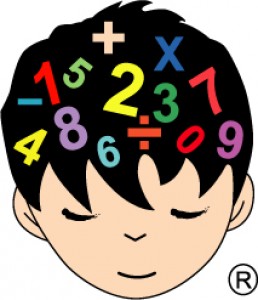Mental arithmetic is making calculations in your mind without the guidance of pencil and paper, calculators etc.
I always knew that I couldn't picture things in my head, until aphantasia was labelled on 2015 I had no idea what else I was missing out.
I've had lots of conversations with family, friends, students and complete strangers about how an aphantasic brain is different from a 'normal' one. I love maths (I'm a science teacher) and dread it at the same time.
How do you do mental arithmetic?
Think about your thought process.
When you have to do mental arithmetic what do you actually do in your head? Do you write it out on a mental piece of paper or a little blackboard and then complete the sum visually?
I'm aphantasic, I can't do that.
Given a simple sum to do in my head causes me to panic. I cannot keep track of the numbers I started with and where I've reached in my solution and end up in a jumbled mess. It's like trying to remember two different mobile phone numbers simultaneously whilst dialling a third. For a long time I thought I was stupid, that I wasn't trying hard enough. I thought there must be something wrong with me. There isn't, I have aphantasia.
If mental arithmetic is making calculations in your mind without the guidance of pencil and paper, calculators etc. and you can write the sum on imaginary paper in your mind, aren't you cheating?
Now in physics lessons I do an approximate calculation in my head and I either quickly scribble the sum down on a piece of paper or use a calculator to get the real answer. I prep my lessons with pages of working out and solutions to questions I'll be using. These are my coping strategies to avoid that mental panic.
I talk to my students about mental arithmetic being a real challenge for me and how I hate being put on the spot to give an answer. I used to work for a head teacher who taught maths, if a member of staff walked into his room whilst he was teaching they'd be given a mental arithmetic question to answer. Hell on Earth! I once emailed him from outside the door to ask him for a moment so that I could hand him my notes on a meeting that he'd asked me to take to him, anything to avoid walking through that door. Afterwards he questioned my professionalism.
Recently I invigilated a mock non-calculator maths paper. Wow! If I was taking that paper it would be covered in little sums and I'd probably run out of blank space. Does this mean I can't do maths? No. It means I need a little more thinking time and pen & paper.
I've talked to students about this with the aim of making them more comfortable and less embarrassed about their own challenges. I dropped A Level maths after a year because I constantly felt that I wasn't good enough because of my inability to do mental arithmetic. I don't want any of my students to feel limited because of their special educational needs. One day I'll make time to take my A Level maths.








